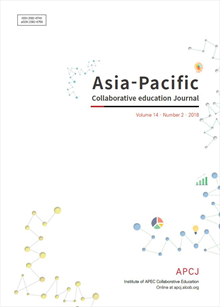간행물
Asia-Pacific Collaborative education Journal

- 발행기관 APEC국제교육협력원
- 자료유형 학술지
- 간기 반년간
- ISSN 2092-674X (Print)2092-6758 (Online)
- 수록기간 2004 ~ 2021
- 주제분류 사회과학 > 교육학 사회과학 분류의 다른 간행물
- 십진분류KDC 371DDC 379
권호리스트/논문검색
Volume 5 Number 1 (2009년 6월) 4건
1.
2009.06
구독 인증기관 무료, 개인회원 유료
This paper presents a case of the implementation of international distance courses between two universities of Taiwan and Japan in Asia-Pacific area. It reports the design of activities engaged in learning with supports of various communication tools. It also examines the students’ interaction and context of learning in distance education. The paper begins by briefly introducing the initiatives, the curriculum and the instructional design on implementation of the case. It then presents results of the study with discussion, along with assessment data available on its success. Meanwhile, it also explores cultural interaction among students and class dynamics observed throughout this study. Finally, this paper closes by making recommendations for further research possibilities and practical applications aiming at enhancing international distance education.
4,300원
2.
2009.06
구독 인증기관 무료, 개인회원 유료
This two-stage project attempts to create a curriculum model of effective Education for Sustainable Development at the Cyber University level. Consider Stage 1 of this paper, the researchers present an overview of ESD in Higher Education, and then discuss the factors and relative qualities of ESD for e-learning purposes. The focus then shifts to developing a conceptual model of Cyber University learning as conceived by studying the education practices at Hanyang Cyber University, Seoul Korea. Using a mixed method approach, the theoretical model from this preliminary work is to be measured in a future research project named Stage 2 in terms of its support of proactive e-learning strategies for ESD. From conceptualizing the preliminary theoretical framework to formulating the model design, this project critically explores the potential contribution of the Cyber University for ESD.
4,900원
3.
2009.06
구독 인증기관 무료, 개인회원 유료
Abstract In this article, we examine two different kinds of national e-learning evaluation implemented in Korea (2007) and in Finland (2007-2008). The following evaluation guidelines were compared: objectives, methods, models, standards, results and follow up procedures. Our study indicates that evaluations should be interpreted in the operational contexts. Common to both Korea and Finland is a concerted effort to continuously develop e-learning in higher education and strengthen international cooperation in quality assurance of e-learning. Korea has systematically developed cyber universities and is able to offer her citizens extensive opportunities for flexible life time learning. The strength of e-learning at Finnish universities of applied sciences is the national network-like collaboration through the Finnish Online University of Applied Sciences. This study creates a foundation for further research and a benchmarking process in which development needs can be identified, good practices shared and sustainable quality assurance solutions found in an increasingly global world.
5,400원
4.
2009.06
구독 인증기관 무료, 개인회원 유료
The rapid change of information and communication technologies (ICT) has resulted in a new gap, a digital divide between countries that can easily access ICT and digital information, and countries that lack accessibility of emerging information and communication technologies. Realizing the gap of digital divide through education, Korea launched a collaborative program called ‘APEC Cyber Education Network (ACEN)’ in 2001, targetting two economies: Indonesia and Thailand. This program provided workshops via ACEN Internet Volunteers (AIV) for training of the teachers’ capacity for economies’ beneficiary in the education of ICT. In 2003, this program has evolved into APEC Learning Community Builders (ALCoB) Internet Volunteers (AIV) program, and has continued until 2008. In this paper, we report our 8 years of experiences in collaboration between Korea and Indonesia through volunteers, and show the implications of a successful international cooperation model to overcome the digital divide between countries.
4,600원

